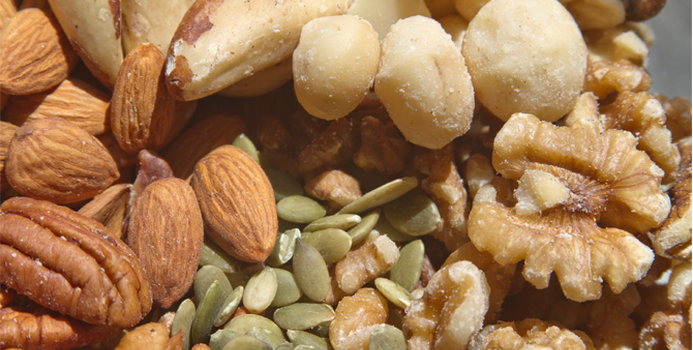The different types of dietary fats can be confusing, but monounsaturated fat has generally escaped the past negative connotation associated with other types of fat such as saturated or even omega-6 polyunsaturated fats. So why is monounsaturated considered healthy and what makes it different from other types of fat? Let's take a look at monounsaturated fat and how it can benefit your diet.
Types of Fatty Acids
Fatty acids come in two main forms: saturated and unsaturated. Saturated fats are solid at room temperature and come from animal products, coconut or palm sources. Butter, coconut oil, and animal fat are examples of dietary saturated fat. Saturated fats are "saturated" with hydrogen molecules on a molecular level while unsaturated fats are missing hydrogen molecules and instead have a double bond which makes them liquid at room temperatures, or in oil form. Unsaturated fats come in many varieties and are found in plant sources such as nuts, seeds, grains, and some fruit such as avocado and olives.
Unsaturated Fat
Unsaturated fat comes in two varieties: monounsaturated (MUFA) and polyunsaturated (PUFA). The difference between the two is chemical. Monounsaturated fat has only one double bond in the fatty acid chain (mono meaning 'one') while polyunsaturated has more than one double bond (poly meaning 'more than one'). Both of these types of fats deserve a place in a healthy diet, and often foods are made of a combination of fats. For example, olive oil is predominately MUFA but contains PUFA as well. Generally speaking, unsaturated fat has been associated with reducing bad cholesterol (LDL) levels and potentially lowering risk for heart disease and stroke. These fats also contain healthful antioxidants like vitamin E.
Examples of food that contains monounsaturated fat include:
- Avocados
- Canola, olive oil, peanut, macadamia nut, and sunflower oils
- Nuts like almonds, pecans, hazelnuts, Brazil nuts and pistachios
- Olives
- Pumpkin and sesame seeds
- Whole wheat
Health Benefits of Monounsaturated Fats
Monounsaturated fat may be beneficial to your health and fat is part of a balanced diet. Research on olive oil shows that intake of MUFAs, especially when intake of MUFAs partially replace saturated fats, can reduce health risk including all-cause mortality, cardiovascular mortality, cardiovascular events, and stroke. Studies also show that consumption of MUFAs in the diet can improve the ratio of bad cholesterol (LDL) to good cholesterol (HDL) in a favorable way. The Mediterranean diet is known for being high in monounsaturated fats like olive oil, nuts seeds and whole grains which is one reason it is known for being heart healthy. Other staples of this diet are a high intake of fruits and vegetables as well as the inclusion of fish and seafood while limiting red meat and salt.
Keep in mind that all fat is high in calories, providing 9 calories per gram versus 4 calories per gram in carbohydrates and protein, so being aware of portion sizes is important -- a little goes a long way. Though saturated fat has ceased to be villainized as it once was and we now understand that fat is a critical part of the diet, studies still show that health benefits may arise if some saturated fat in the diet is replaced with unsaturated fats, especially MUFAs. For example, cook with olive oil instead of butter or use an oil-based salad dressing instead of ranch. MUFAs should be incorporated into an already healthy diet full of unprocessed fruits, vegetables and whole grains for optimal health. 
Ginger Hultin, MS, RD, LDN is a Chicago-based dietitian who specializes in integrative oncology. With a Master's degree from naturopathic Bastyr University, she practices plant-based nutrition and specializes in lab interpretation and appropriate supplementation. Ginger also had a passion for fitness and maintains both group fitness and personal training certifications.



